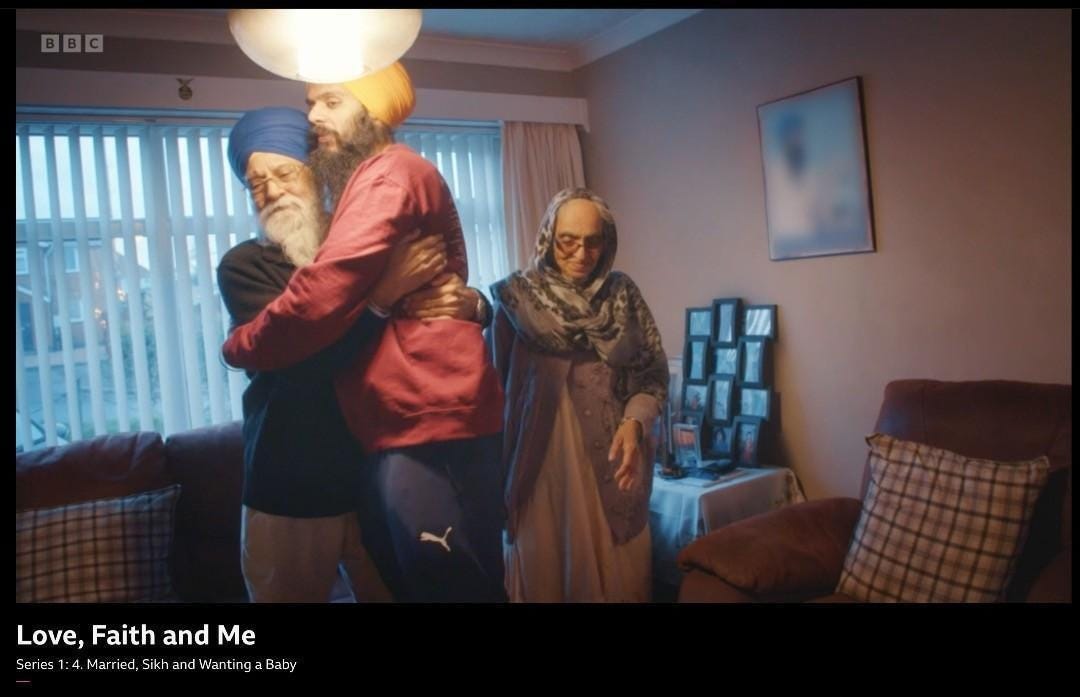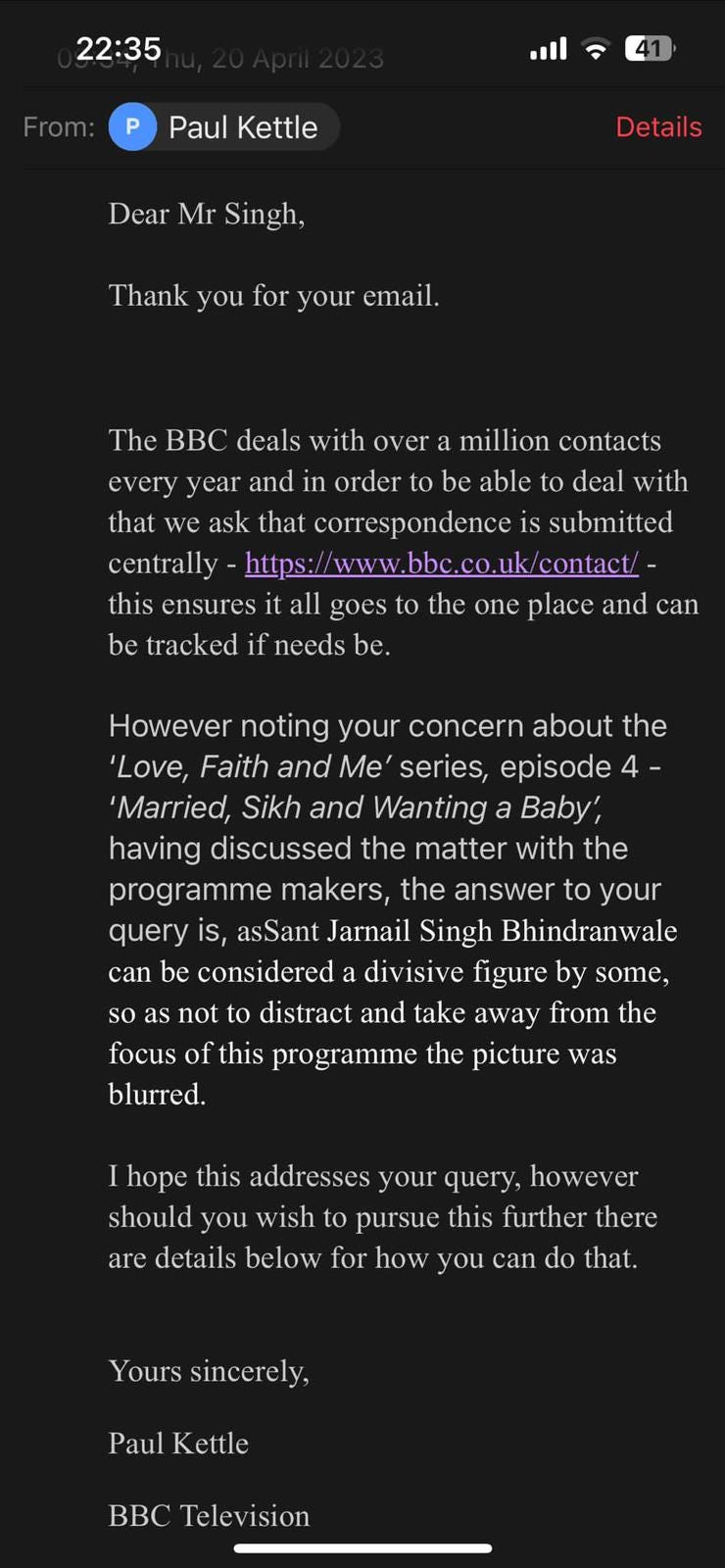Jasveer Singh: BBC's Sikh Censorship Is Unacceptable
"Sant Ji’s image was blurred due to him being seen as a 'divisive figure by some' and the BBC did not want to 'distract and take away from the focus of the programme...'"
Jasveer Singh
June 2, 2023 | 4 min. read | Opinion
If there is anything at all one would expect from a documentary, it is authenticity. That is what documentaries are for. Real stories about real people.
Roughly a month ago, when it came to giving real insight into a Sikh family, the BBC decided to forego this principle and erased an important element of the subject matter’s faith.
On April 13, 2023, BBC One aired a documentary by Milk and Honey Productions on the amazing work of Himmat Co, a Sikh-run fertility journey support network.
As the show aired, many Sikhs were shocked to see a portrait of Sant Jarnail Singh Bhindranwale blurred out. The picture was on the wall in the home where the documentary was being filmed.
Why would the BBC blur out the portrait? What would make them hide an aspect of the faith of a family they were documenting? Was something bigger at play here?
Shere Panjab UK, a Panjabi Sikh community group, followed up with the BBC and in an email response, a BBC representative said Sant Ji’s image was blurred due to him being seen as a “divisive figure by some,” and the BBC did not want to “distract and take away from the focus of the programme” - a programme that happened to be touching on faith.
That a picture of Sant Ji, on the wall of a family’s living room a production team was welcomed to film in, was deemed so “divisive” that it was censored disturbed many. This is, in my opinion, an opinion anchored in over eight years of work in exploring issues between the media and Sikhs, one of the most depraved examples of Sikh censorship I have ever come across.
It is likely the BBC was not actually worried about complaints from Sikhs. Instead, they were probably more worried about a deluge of Hindu Nationalist types bombarding them with complaints and posting on social media that the BBC was platforming Khalistanis.
However, what is most disturbing to me is the fact the BBC decided, without permission, to erase an aspect of the faith of a Sikh family they were meant to be providing an authentic insight into.
This family, primarily seen through the couple Sarina Kaur and Vikramjit Singh Khalsa, who lead Himmat Co, came across as nothing but sweet, loving and honest Sikhs. The BBC and Milk and Honey Productions chose to hide Sant Ji from being part of that beautiful image of a Sikh family, even though it was visible for just a few seconds. Trying to separate Sant Jarnail Singh Khalsa Bhindranwale from being connected to a warm, affable Sikh family the public would be rooting for is the peak of anti-Sikh censorship.
What is the precedent we are allowing here?
Would the BBC blur out a picture of this “divisive” figure if it was displayed at a heated Sikh protest? Will they blur Sant Ji’s image out of any Nagar Kirtans they may film in future? What gives the BBC the right to hide authentic aspects of the Sikh faith? Which other historical figure revered by so many could be viewed as so controversial they would need to be blurred out of the background like this? Is there another minority community that could be treated this way?
These questions become extra concerning when considered in the broader context of BBC’s Sikh censorship.
In 2019 Lord Singh, a member of the UK House of Lords and someone that the media have long selected as a Sikh spokesperson, complained of BBC's “intolerance” after being told his Thought For The Day radio piece may “offend Muslims”. Lord Singh, who had 35 years of experience contributing to the radio segment, said the topic deemed offensive was the tale of Guru Teghbahadur Ji Maharaj’s Shaheedi (martyrdom) at the hands of India’s Islamic Mughal rulers.
Further concerns of Sikh censorship at the BBC date back to 1984, when many felt perturbed at the coverage of the incidents around the Sikh genocide as covered by Sir Mark Tully, BBC’s Delhi correspondent at the time.
More recently, the BBC has misreported basic facts about the #FarmersProtest, leading to a protest outside the broadcasting giant’s offices. Coverage of Bhai Amritpal Singh from the BBC was also skewed towards demonising the Sikh leader. Such issues with reporting, which also involve an indirect form of censorship that overlooks a Sikh Panthic perspective, are more common. The more overt type of censorship that sees images blurred out and whole stories pulled from the radio is rarer. Yet, the BBC is steadily building up a reputation for this regarding Sikhs.
The Indian state's oppression of Sikhs has long used a tactic of trying to separate the Sikh identity into two categories. On one side is the Sikh “patriot”, defender of the nation, feeder of the hungry, loyal to the leaders of a country where we are a thriving and assimilated community, the model minority, if you will. The other category is of the Khalistani; loyal to the “divisive” Bhindranwale, a threat to the country's stability, and determined to stand out rather than blend in.
This dichotomy can also be applied to the cultural identity of diaspora Sikhs too. Yet, it is a completely false portrayal of Sikhs. The truth is many, maybe most, Sikhs can fit both profiles simultaneously.
Sant Ji has vast support within the ranks of the Sikh humanitarians who are celebrated globally. That is because Sikh sovereignty is as intrinsic to the faith as the idea to feed our communities. These concepts are entwined. Sikhs take responsibility for our areas. We fight injustice through the cauldron and the sword.
But this reality of the Sikh way of life is being hidden by the media. And there is no more perfect example of that than what the BBC did during the airing of Married, Sikh and Wanting a Baby.
SikhPA's attempts to pursue further discussion on this issue have been ignored by Milk and Honey and the BBC ever since, despite our role in providing the idea for the show, facilitating their engagement with Himmat Co, and even providing them with a glossary of Sikh terminology. Our attempts for dialogue onthis issue with the BBC continues.
Jasveer Singh hails from Southall, UK, and is the Senior Press Officer of The Sikh Press Association, a position he has held since 2015. In this role, Jasveer works across all sectors of media supporting Sikh organisations and individuals on Panthic endeavours. Jasveer previously worked as a freelance journalist which included stints with Sky News, Super Fight League, and more. You can find Jasveer on Twitter at @Jazzthejourno.
Baaz is home to opinions, ideas, and original reporting for the Sikh and Punjabi diaspora. Support us by subscribing. Find us on Twitter, Instagram, and Facebook at @BaazNewsOrg. If you would like to submit a written piece for consideration please email us at editor@baaznews.org.




